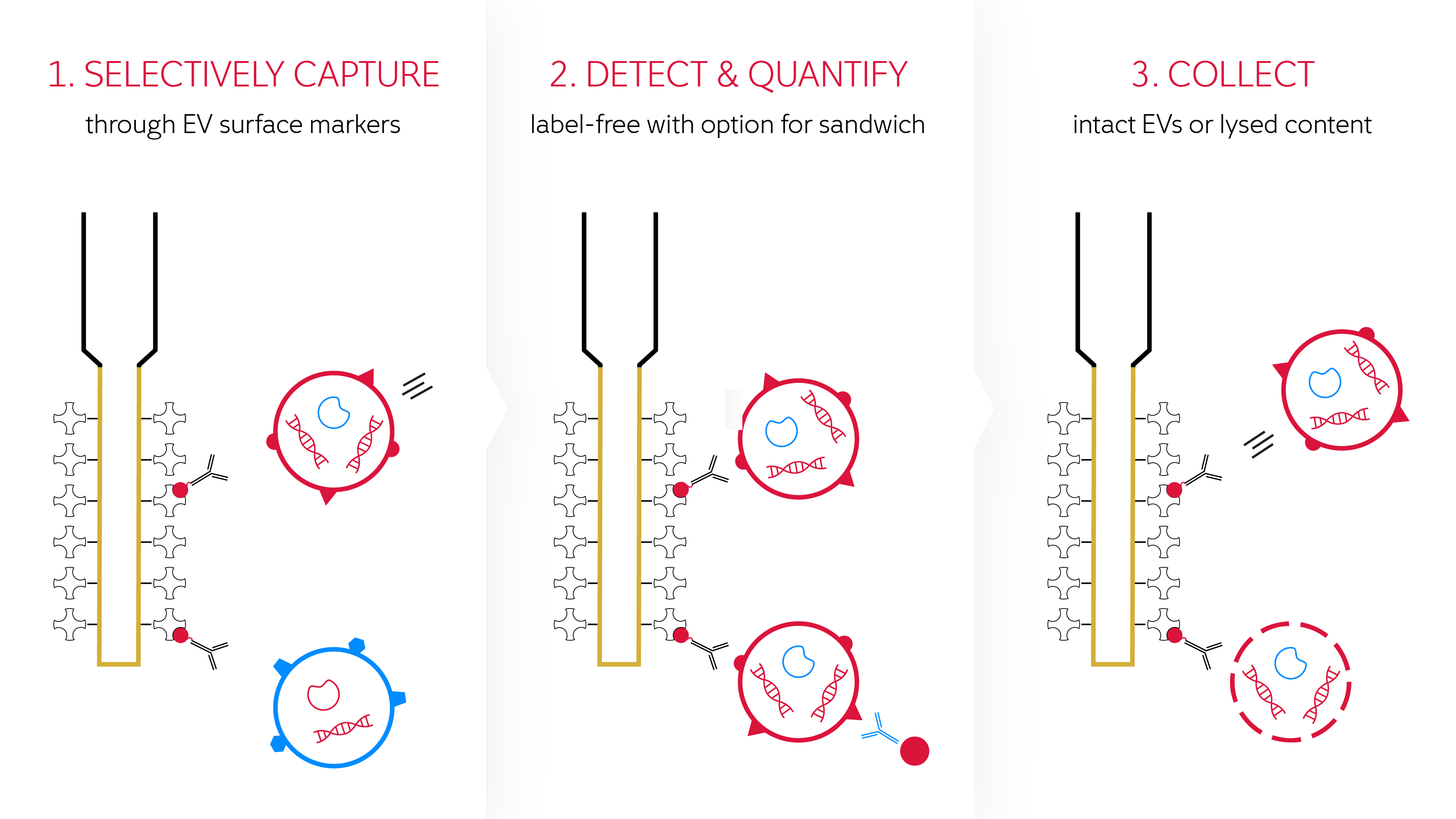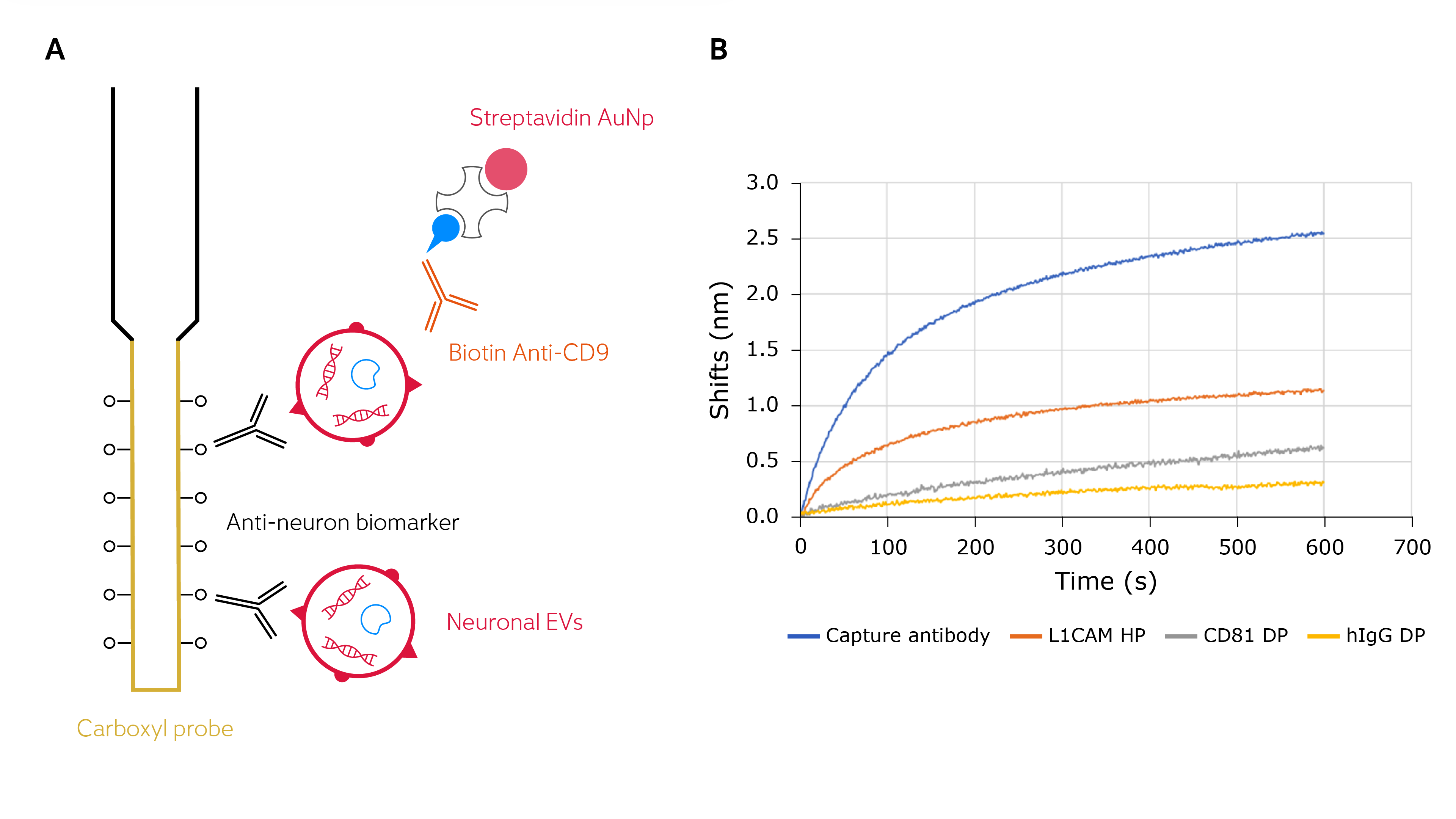WHITE FOx bridges the gap between isolation and quantification to provide effective analytical EV workflows. It provides fast and convenient calibration of affinity collected EV for downstream analysis.
- Simple, integrated one-step affinity isolation and quantitation.
- Highly sensitive and marker specific.
- Hours, not days. Automated
- Perform directly in cell culture media or blood plasma samples.
- nm to µm vesicle size range.
Case study:
Real-time quantitation of extracellular vesicles in complex biofluids
WHITE FOx detects extracellular vesicles quickly and accurately at physiologically relevant concentrations.
- Sensitivity up to 103 – 104 times higher than required for EV detection in healthy or cancer patients’ plasma.
- Selectively captures EVs with breast cancer biomarkers in blood plasma.
Extracellular vesicle detection and quantification.
A. Capture antibodies on the dip-in probe bind marker-specific EVs in a label-free configuration, with optional fast signal amplification via detection antibodies and gold nanoparticles.
B. EV detection possible down to 3.5×107 particles/ml with anti-CD63/ B anti-CD9 capture-detection antibodies using signal amplification (plot adapted from Yildizhan et al., 2021).
A. Capture antibodies against neuron tissue marker covalently bound to the dip-in probe bind neuron-specific EVs followed by signal amplification via detection antibodies and gold nanoparticles.
B. Marker-positive EVs in disease patients (DP) and healthy (HP) shown by shift. CD81 DP indicates total captured EVs compared to hIgG DP negative control.
Case study:
Characterizing and isolating cell-type specific EVs in blood
WHITE FOx provides fast and easy isolation of neuronally derived EVs directly in human plasma of healthy and Alzheimers disease patients.
- Repeat capture cycles for cumulative depletion of EVs from the source sample and delivery to the target solution.
- Neuron biomarker EVs can be quantified and collected from plasma samples of diseased patients and healthy individuals.
Relevant publications
Page 1 of 1
App Note: AN6 Sample-prep-free extracellular vesicle isolation in biological samples
Efficient quantification and isolation of extracellular vesicles with a fast and sensitive dip-in assay WHITE FOx can directly isolate tissue marker-specific extracellular vesicles (EVs) from minimal quantities of blood plasma...
July 10, 2024
App Note: AN5 Want to detect extracellular vesicles directly in complex samples?
Sensitive and efficient detection of extracellular vesicles using a fast dip-in assay with minimal hands-on time WHITE FOx streamlines the detection and quantification of extracellular vesicles (EVs) in highly heterogeneous...
White paper: WP9 Isolation of neuron-specific extracellular vesicles from human plasma using FO-SPR
White paper 9 | Version 2 | Tobias Zbik, Filip Delport SUMMARY Extracellular vesicles (EVs) are an increasingly popular target in the search for novel biomarkers in the field of...
January 25, 2024
Detection of Breast Cancer-Specific Extracellular Vesicles with Fiber-Optic SPR Biosensor
Yildizhan et al. (2023) International Journal of Molecular Sciences DOI: 10.3390/ijms24043764 Extracellular vesicles (EVs) have attracted great attention as potential biomarkers for cancer diagnostics. Although several technologies have been developed…
February 15, 2023
Immunogenic affinity and extracellular vesicle quantification in blood with FO-SPR
June 20-22, 2022 – MOSBRI Scientific Conference Our CTO, Dr. Filip Delport, had the opportunity to present at the 1st MOSBRI Scientific Conference in June 2022. He explained how the…
December 8, 2022
White paper: WP5 Extracellular vesicle quantification in complex matrices
White paper 5 | Version 2 | Kris Ver Donck, Filip Delport, Kim Stevens Based on original publication: Yildizhan et al. (2021) Journal of Extracellular Vesicles. 10 (4) ABSTRACT Fiber-optic...
December 15, 2021
FO-SPR biosensor calibrated with recombinant extracellular vesicles enables specific and sensitive detection directly in complex matrices
Yilidzhan et al. (2021) J. Extracell. Vesicles 10 Extracellular vesicles (EVs) have drawn huge attention for diagnosing myriad of diseases, including cancer. However, the EV detection and analyses procedures…
February 23, 2021
Page 1 of 1
For Research Use Only. Not for use in diagnostic procedures.




